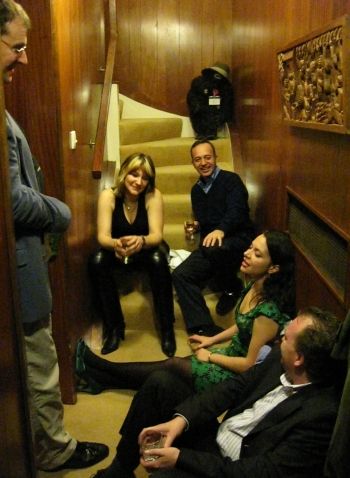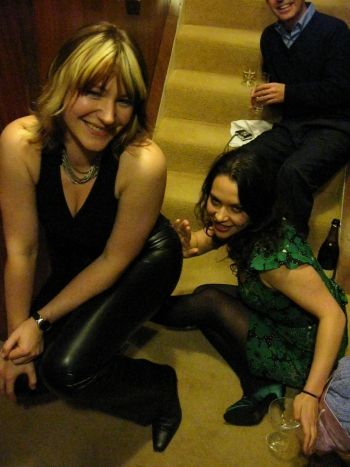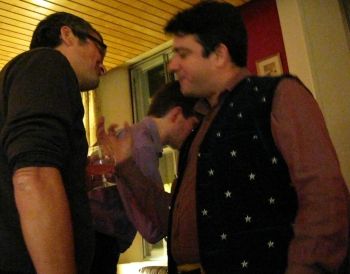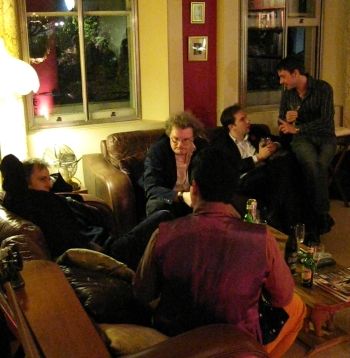We are developing the social individualist meta-context for the future. From the very serious to the extremely frivolous... lets see what is on the mind of the Samizdata people.
Samizdata, derived from Samizdat /n. - a system of clandestine publication of banned literature in the USSR [Russ.,= self-publishing house]
|
Thirty one stalwart samizdatistas plus assorted friends and allies descended on Samizdata HQ last night/early this morning for our celebration of five years on the front line of the blogosphere.

Two of Samizdata’s editors presided over the festivities

The damn paparazzi were everywhere

People tended to congregate around the alcohol

As the hordes started to pack into Samizdata HQ, others took up defensive positions on the stairs

Our fearless editor seemed strangely surprised that her spray-on
leather pants caused people to have an irresistible urge to touch…

…or spank…

… or smack

Yet people seemed quite uninterested in Brian’s rear-end

Kamal demonstrated how to do anatomically improbable things with corks,
yielding gasps of admiration from enraptured onlookers

The food from Penni Black was excellent and greatly improved the ability of
the assembled samizdatistas to absorb the waves of high quality alcohol

Guido Fawkes reminded us all why we blog (however there
was some debate as to whether he meant ‘freedom’ or ‘beer’)…

But Jax was in no doubt that the answer was indeed ‘beer’

Guido demonstrated his patented “grab ’em by the googlies an’ squeeze” tactic to
Peter Briffa but Jonathan Pearce seemed more interested in communing with
his Martini (shaken, not stirred)

As the evening wore on, Paul Coulam shared his technique for remaining upright
(i.e. frequently look to see which direction the floor is)

The ‘sitting down’ method of avoiding unexpected non-verticalness was also widely adopted towards the end
Golf. There’s a sport to stir up hot passions or deep waves of apathy among certain people. British blogger Clive Davis is clearly not a fan of the sport once described, I believe by Oscar Wilde, as a good way of spoiling a good walk (okay, it may have been said by one of those other smartypants writers who are quoted for their supposed wit and wisdom, but whatever). Clive does not care much for the sort of people who often play golf and for the way it is often used by political types – mostly rightwing ones – in the United States. He has a point. Golf bores are tedious, just as football bores, rugby bores, athletics bores, horse racing bores (now that is really boring) or F1 motor racing bores, are, er, boring. However, Clive’s post hits a duff note in having a poke at Michael Douglas, in my view. Douglas, as well as being outrageous enough to have married Catherine Zeta-Jones, is a golf nut! Aaaaggghhh. I do not know why Douglas seems to bring out a certain hostile reaction in some folk. His Gordon Gekko remains, for me, one of the highlights of 20th Century cinema (yes, really). And I distinctly recall that Douglas, shortly after 9/11, decided to fly over to the UK for an Anglo-US amateur golf tournament, shrugging off worries about security to slug it around the links. He won my respect for that move.
Golf is both a team game and an intensely individualistic one and the latter point may explain its enormous popularity in certain parts of the world and also explain its appeal to a certain demographic. Although the number of people has expanded a lot in recent years as people get richer and due to the influence of the mighty Tiger Woods, it is still overwhelmingly viewed as a sport for the gin-and-tonic slice of the population (although I see nothing actually wrong with that). It is also a social game in that it is often the sort of game that allows people to discuss business and so on as they go around the course. My brother, a lawyer, seems to get briefed most of the time when he is on the fairways. (He once beat his boss and made a mental point not to do so again).
And I suspect this taps into the continued links between sport and class in the English-speaking world, especially in Britain. Golf, rugby union and arguably, cricket, is middle class, while polo or yacht-racing is seen as posh, and football (soccer) and rugby league is working class. I often find that people often reveal themselves quite a lot when “their sport” gets “invaded” by non-typical supporters. In the last soccer World Cup tournament in Germany, for example, I remembered reading comments by football regulars denouncing all those Home Counties types for showing a sudden interest in the English team selection, although perhaps England would have fared better had Ericsson paid some attention to their views. And the same goes, I recall once, when I went along to a sailing regatta and overheard some old salt muttering about “Chavs” becoming interested in sailing (an unlikely prospect, as far as I can tell. I cannot quite envisage this part of the English population wanting to navigate a yacht or change a spinnaker at speed in a heavy sea).
Anyway, as I write, it is around 3pm. Time for the football to begin.
Our next Prime Minister speaks.
In the wake of the BNP pair’s acquittals, Chancellor Mr Brown said: “Any preaching of religious or racial hatred will offend mainstream opinion in this country.
“We have got to do whatever we can to root it out from whatever quarter it comes.
“And if that means we have got to look at the laws again, we will have to do so.”
On the other hand there are countries where the law is changed in order to prosecute the ordinary activities of those whom the government chooses to classify as criminals because it is politically convenient to do so. Should there be no evidence on which a jury will convict, the law can be changed till the public enemy is punished, you can punish them anyway even if they are acquitted, or you can always keep juries, burden of proof and testing of evidence out of it altogether in selected cases.
The traditional test in designing the criminal law in western legal systems – common law or civil law – was to ask, “What mischief does the law address?” or “What harm to persons, property, or society as a whole, does it seek to prevent or punish?” Libertarians might be troubled by the unlimited scope of “society as a whole”, but universalism – the treatment of all persons the same in the same circumstances, and framing the law on general principle rather than special cases – was once deemed fundamental to the rule of law. Indeed there is a common law maxim: hard cases make bad law, that warns that attempts to extract jurisprudence from the merits of the parties involved result in dangerous incoherence and uncertainty (the career of the late Lord Denning is replete with example) .
What should we call a jurisdiction where criminal liability is determined principally by the identity of ‘the criminal’ which is to say, whoever it is the authorities determine should be punished? Not lawless, because all these things are done under the colours of law, most legalistically. I think Tony Blair would call it ‘modern’. I think I would call it a ‘pyramid of bullies’.
The idea that any country has universal jurisdiction over citizens of other countries, and can try them for actions taking place in yet a third country, would be risible if it were not deeply offensive.
One would think the Germans, of all people, would exhibit a tad more humility in these matters, but if the assertion of universal jurisdiction is not symptomotic of a colossal arrogance, I do not know what is. You would have thought we kicked this nonsense out of the Germans during the ’40s, but I guess not.
It also makes the concept of ‘representative government’ rather irrelevant – after all, the Americans who are apparently now subject to German law never voted in any German election.
It does place our new Democratic overlords in rather an awkward spot; they loathe Rumsfeld, but I suspect that even they are reluctant to bundle him off to Germany for judgement by lefty Euros and miscellaneous anti-American yahoos. After all, if a Republican official is subject to German judgement, why, so might be a Democratic official, should the Rodham-Clinton administration find it necessary to stand up to the jihadis in ways that the neo-dhimmis of Eurabia find offensive.
noun. A very long blog article
Usage: “Paul Marks has done another Blogapotamus on Samizdata.net”
I was on 18 Doughty Street intertelly last night, and I really enjoyed myself, not least because Iain Dale, presiding, also seemed satisfied with the efforts of me and my fellow late night chatterers. I was also on 18 Doughty Street on only its second night in action, and it was a mild relief to get asked back. That is the only compliment that really matters after you’ve been on something.
Many intriguing things got alluded to, but the basic message I want to put across here, now, is that, basically, 18 Doughty Street is doing very well. When I was first on, there was a palpable air of panic, with people saying things like “I can only do one thing at a time” through clenched teeth and with that terrifying evenness that people do just before they explode. This time, things were working more smoothly. Which is just what you would expect. → Continue reading: 18 Doughty Street TV is doing very well
On November 2nd, 2001, I rounded up a posse of disgruntled hyphenated libertarian types on three continents and an island, telling them they were henceforth ‘samizdatistas’ and offered them a way to get their ‘gruntles’ back that was far more effective than cursing at the television every time the news came on.
We started off initially on blogger.com along with many other so-called warblogs, before eventually migrating to Moveable Type.
We drew our initial inspiration from Glenn of Instapundit fame (and duly got Instapundited quite a few times) as we raged anti-idiotarian fury against the mainstream media’s editorial absurdities.
We coined a few terms which seem to have gained wider currency, such as Moonbat and Tranzi. We learned the fine art of fisking, slew some trolls, stomped on a lot of blogroaches, fact-checked a few asses and we wrote more than a few blogapotamus postings.
Putting one in the eye of The Man yields many benefits and millions of page views, a couple crashed servers, 8,651 articles and 129,117 comments later, Samizdata.net once again proves that not only is blogging far more fun than gainful employment, it is a great excuse for throwing parties… and thus tonight at 7:00pm London time we hold our Five Year Blogger Bash, therefore expect light blogging from the UK contingent and possible heavy casualties by tomorrow morning.
As I write I am sitting in a motel room in Colorado after two days of meetings in Wyoming associated with the launch of a new company. I am sad to say I will miss the coming festivities of the Samizdata Fifth Anniversary party so I hope those present have a wonderful time.
Meanwhile back in Colorado… exactly why is it I am blogging about the start up of another commercial space company?
Perhaps it is the officers of the new company, Wyoming Space Information Systems (WYSIS) : James C Bennett, CEO; Dale M Amon, CTO; and Rand Simberg, Space Operations.
I expect Rand will also make some announcement on Transterrestrial Musings if he has not done so already, and I will post more information as we finalize and develop plans.
I do not know (I seldom do) whether this is original or not, but it sounds like a very significant achievement, which these people have at least copied and marketed quite well, or, better yet, may actually have semi-invented.
Gizmodo reports:
An amazing innovation in the software world today: ALIPR (Automatic Linguistic Indexing of Pictures) is a program that takes a look at digital images, applies some fancy math and then spits out a list of appropriate tags for the picture. It isn’t perfect, but the designers claim it has a 98 percent accuracy rate. They’ve been letting it dig through Flickr and the software has matched at least one user-defined tag almost every time.
As a constant searcher for photos, I have often found myself exclaiming “I wish you could search pictures!” By that I do not mean merely search the titles and wording that people have attached to pictures. I mean search the actual pictures themselves. It would appear that this process is now well and truly under way.
But, does this stuff have a dark side? How soon before you can take a photo of someone, and say to the internet: Show me all the other photos you can find of this person. You could learn a lot, including quite a few things he might not want you to know. Imagine that kind of thing combined with searching through pictures like these, which I like to take of London tourists.
I have been browsing through John Battelle’s book The Search (no problem finding books on the internet) in recent days, and he has interesting stuff on the privacy-invading potential of this kind of thing. (And oh look, Battelle’s Searchblog reports on something very similar to the ALIPR thing, by the sound of it.)
Oh dear. The original idea of this posting was to be writing about something good, to counter the relentless temptation of those who want the world to get better but cannot help noticing all the ways in which it is getting worse. Never mind. Gizmodo has lots of other stuff like this. (Now you can do your work on one screen, and have crazy pictures on the other.)
As does this blog, which I also recommend. Sample quote:
Women aren’t even trying to pretend they don’t like having sex with robots any more.
More bad news. But the good news is that if you want more pictures along those lines, they just got easier to find.
With Democratic control of the Senate confirmed, one wonders what the next two years will bring on the domestic scene.
Its easy to say what will not happen: There will not be any form of tax relief or reform, or reform of entitlement programs. And no, I do not see expansion of such programs as reform. In short, it is hard to imagine anything happening that will advance the cause of limited government.
On the tax front, the only question will be whether the President will have the stones to veto a tax increase bill. Certainly the Senate, and in all probability the House, will be more than willing to send him one. Given this President’s indifference to the virtues of small government and his status as a lame duck with no re-election chances to blow, I think the odds are that he will sign it.
On spending, expect more of the same. The Dems’ main complaints about Republican spending have been that (a) it has not been enough (b) it has not been directed to Dem constituents and (c) it has not been accompanied by tax increases (this is what passes for fiscal responsibility in Washington these days). Will ‘compassionate conservative’ Bush veto spending bills because they redirect money to Dem causes rather than Repub? I can not imagine why.
Oh, expect knock-down drag-out fights over court nominations, especially if another Supreme goes down. In fact, I would expect any nominee to fail, unless they are a squishy statist who is willing to yammer on about how the Constitution is a living document.
Expect investigations out the wazoo, which should paralyze the executive branch (not that that would take much) and the intelligence community (hmm, bug or feature?) and produce lots of political theater, but in the end it will all signify nothing. These investigations are actually Pelosi’s best opportunity to divert and satisfy her nutty lefties (if she cares to do so). The alternative is to let them actually try to make policy (shudder).
A couple of issues to keep an eye on. The Dems have gone dark on the issue of gun control, but there is no reason to believe they do not still want it. One sign of their (over?)confidence in their position will be if they feel bold enough to come back out of the closet on this issue.
For a very early indicator of whether the Dems are serious about governance, keep an eye on who gets the chairmanship of the House Intelligence Committee. The presumptive chair, Alcee Hastings, belongs to a very exclusive club – federal judges who were impeached and removed from office for corruption. If Pelosi gives him the job, then look for a wild ride for two years, because the inmates will truly be running the asylum.
After an election in which “although many individual races were close the cumulative effect was a thumping” I watched President Bush give a brief statement and then spend the best part of a hour answering questions from a room full of journalists many of whom are his sworn enemies.
Political leaders in Britain do not react to election defeats that way – the give a statement and perhaps answer a question or two (normally not) and then run away.
I may disagree with a lot of things about what President Bush has done (for example I think that he has made the entitlement program burden, about which he rightly warned today, even worse than it was before he came into office), but he is clearly a man of great courage.
I could not have done what I watched him do today.
|
Who Are We? The Samizdata people are a bunch of sinister and heavily armed globalist illuminati who seek to infect the entire world with the values of personal liberty and several property. Amongst our many crimes is a sense of humour and the intermittent use of British spelling.
We are also a varied group made up of social individualists, classical liberals, whigs, libertarians, extropians, futurists, ‘Porcupines’, Karl Popper fetishists, recovering neo-conservatives, crazed Ayn Rand worshipers, over-caffeinated Virginia Postrel devotees, witty Frédéric Bastiat wannabes, cypherpunks, minarchists, kritarchists and wild-eyed anarcho-capitalists from Britain, North America, Australia and Europe.
|


















